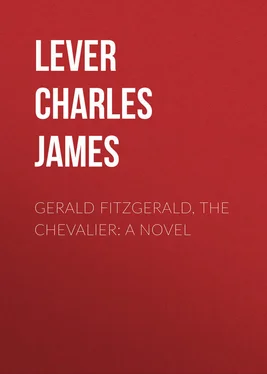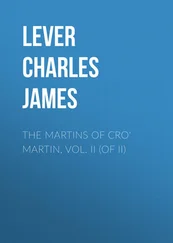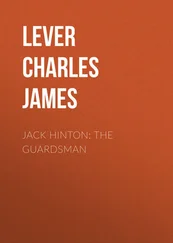Charles Lever - Gerald Fitzgerald, the Chevalier - A Novel
Здесь есть возможность читать онлайн «Charles Lever - Gerald Fitzgerald, the Chevalier - A Novel» — ознакомительный отрывок электронной книги совершенно бесплатно, а после прочтения отрывка купить полную версию. В некоторых случаях можно слушать аудио, скачать через торрент в формате fb2 и присутствует краткое содержание. Жанр: literature_19, foreign_antique, foreign_prose, на английском языке. Описание произведения, (предисловие) а так же отзывы посетителей доступны на портале библиотеки ЛибКат.
- Название:Gerald Fitzgerald, the Chevalier: A Novel
- Автор:
- Жанр:
- Год:неизвестен
- ISBN:нет данных
- Рейтинг книги:3 / 5. Голосов: 1
-
Избранное:Добавить в избранное
- Отзывы:
-
Ваша оценка:
- 60
- 1
- 2
- 3
- 4
- 5
Gerald Fitzgerald, the Chevalier: A Novel: краткое содержание, описание и аннотация
Предлагаем к чтению аннотацию, описание, краткое содержание или предисловие (зависит от того, что написал сам автор книги «Gerald Fitzgerald, the Chevalier: A Novel»). Если вы не нашли необходимую информацию о книге — напишите в комментариях, мы постараемся отыскать её.
Gerald Fitzgerald, the Chevalier: A Novel — читать онлайн ознакомительный отрывок
Ниже представлен текст книги, разбитый по страницам. Система сохранения места последней прочитанной страницы, позволяет с удобством читать онлайн бесплатно книгу «Gerald Fitzgerald, the Chevalier: A Novel», без необходимости каждый раз заново искать на чём Вы остановились. Поставьте закладку, и сможете в любой момент перейти на страницу, на которой закончили чтение.
Интервал:
Закладка:
Ill-regulated and ill-ordered as were all the arrangements of that household, there seemed something beyond all bounds in this neglect of fitting courtesy; and many did not scruple to say aloud how deeply they felt the insult. At one moment they half resolved on deputing a message to the chamber of the Prince; at another they discussed the propriety of departing in a body. Various opinions were given as to the most fitting course to follow; in the midst of which their debate was interrupted by the hoarse flourish of trumpets without, and the loud-voiced proclamation by the heralds, ‘That his Majesty of England had entered into his fifty-second year.’ A faint cheer – the tribute of the careless crowd in the street – and a salvo of cannon from the Quirinal, closed the ceremony, and all was still – so still that for some seconds not a word was heard in those thronged and crowded salons.
‘ Ma foi! ’ cried Count Boyer at last, I suppose we may go home again. Not ours the fault if our duty has not been offered with sufficient respect.’
‘My master,’ said the Spanish envoy haughtily, ‘will probably think my patience but little deserving of his praise.’
‘And I,’ said a German baron, all covered with decorations, ‘have brought this letter of gratulation from the Margrave of Baden, and, for aught I see, am like to carry it back to his Serene Highness.’
‘As for me,’ said Count Bjosterna, the Swedish minister, ‘I serve a master who never brooked an insult; and lest this should become such, I ‘ll take my leave.’
‘Not so, messieurs,’ cried O’Sullivan, stepping forward, and placing himself in front of the door. ‘You have come here to pay my master, the king of England, certain marks of your respect. It is for him to choose the time he will accept of them. By heaven! not a man of you shall leave this till his good pleasure in that matter be known.’
‘Well said, O’Sullivan!’ said General Upton, grasping the old man’s hand; while MacNiel and some other chieftains pushed forward and ranged themselves before the door in solemn silence.
‘Nay, nay, gentlemen,’ interposed the cardinal-secretary, Gualtieri – a man whose venerable appearance commanded universal respect; ‘this would be most unseemly on every hand. We are all here animated by one feeling of sincere deference and attachment to a great prince. There may be good and sufficient reasons why he has not received our homage. It would ill become us to inquire into these. Not enough for us that our intentions are those of respectful duty; we must mark, by our conduct, that we appreciate the rank of him to whom we offer them.‘To these words, uttered aloud, he added something in a whisper to the principal persons at either side; and, seeming to yield to his instances, they fell back, while O’Sullivan, bowing respectfully to the cardinal, in token of acquiescence, moved slowly away, followed by the chieftains.
This little incident, as may be supposed, contributed nothing to remove the constraint of the scene; and an almost unbroken stillness now prevailed, when at length a carriage was seen to drive from the courtyard.
‘There goes Monsignore Alberti,’ said Count Boyer. ‘Where the secretary of the Pope gives the initiative, it is surely safe to follow. My duty is paid.’ And so saying, and with a deep obeisance to all at either side of him, he passed out. The Spanish minister followed; and now the whole assemblage gradually moved away, so that in less than an hour the salons were deserted, and none remained of all that crowded mass which so late had filled them, except O’Sullivan, MacNiel, and a few Highland chieftains of lesser note.
‘One might be tempted to say that there was a curse upon this cause,’ said MacNiel sternly, as he threw himself down into a seat. Who ever saw a morning break with brighter hopes; and see already, scarcely an hour past the noon, and they are all gone – wafted to the winds.’
‘No, no, MacNiel,’ said O’Sullivan gravely; ‘you are wrong, believe me. These butterflies knew well that it was only a gleam of sunshine, not a summer. The hopes of the Stuarts are gone for ever.’
‘Why are you here, then, if you think so?’ cried the other impetuously.
‘For that very reason, sir. I feel, as you and all these gentlemen here do, that fidelity is a contract made for life.’
‘They were the luckiest that closed that account first,’ muttered one of the lairds, half aloud. ‘By my saul, Culloden wasn’t colder lying than the Campagna.’
‘Come along, we may as well follow the rest,’ said MacNiel, rising. ‘Will you dine with us, O’Sullivan? Mac-Allister and Brane are coming.’
‘No, MacNiel. I have made this anniversary a day of fasting for many a year back. I took a vow never to taste meat or wine on this festival, till I should do so beneath the king’s roof, in his own land.’
‘Ye ‘re like to keep a black Lent o’ it, then,’ muttered the old laird, with a dry laugh, and shuffled along after his chieftain, as he led the way toward the door.
O’Sullivan waited till they had gone; and then, with a sad glance around him, as if like a leave-taking, left the palace and turned homeward.
CHAPTER III. THE ALTIERI PALACE
In a large and splendid chamber, whose only light was a small lamp within a globe of alabaster, Charles Edward lay, full-dressed, upon his bed. His eyes were closed, but his features did not betoken sleep: on the contrary, his flushed cheek told of intemperance, and the table, covered with wine-decanters and glasses, beside him, confirmed the impression. His breathing was thick and laboured, and occasionally broken by a dry, short cough. There was, indeed, little to remind one of the handsome chevalier in the bloated face, the heavy, hanging jaws, and the ungainly figure of him who, looking far older than his real age, now lay there. Though dressed with peculiar care, and covered with the insignia of several orders, his embroidered vest was unbuttoned, and showed the rich lace of his jabot, stained and discoloured by wine. A splendidly ornamented sword lay beside him, on which one hand rested, the fingers tremulously touching the richly embossed hilt. Near the foot of the bed, on a low, well-cushioned chair, sat another figure, whose easy air of jocularity and good-humoured, sensual countenance presented a strong contrast to the careworn expression of the Prince’s face. Dressed in a long loose robe of white cloth, which he wore not ungracefully, his well-rounded legs crossed negligently in front of him, and his hands clasped with an air of quiet and happy composure, the man was a perfect picture of a jolly friar, well-to-do and contented. This was George Kelly, the very type of happy, self-satisfied sensuality. If a phrenologist would have augured favourably from the noble development of forehead and temples, the massive back-head and widely spreading occiput would have quickly shown that nature had alloyed every good gift with a counterpoise of low tastes and bad passions, more than enough to destroy the balance of character.
‘Who ‘s there? Who ‘s in waiting?’ muttered the Prince, half aloud, as if suddenly arousing himself.
‘Kelly – only Kelly,’ answered the friar. ‘Then the wine is not finished, George, eh? that’s certain; the decanters are not empty. What hour is it?’ ‘As well as I can see, it wants a few minutes of five.’
‘Of five! of five! Night or morning, which?’
‘Five in the evening. I believe one might venture to call it night, for they’re lighting the lamps in the streets already.’
‘What’s this here for, George,’ said the Prince, lifting up the sword. ‘We’re not going to Bannockburn, are we? Egad! if we be, I trust they ‘ll give me a better weapon. What nonsense of yours is all this?’
Читать дальшеИнтервал:
Закладка:
Похожие книги на «Gerald Fitzgerald, the Chevalier: A Novel»
Представляем Вашему вниманию похожие книги на «Gerald Fitzgerald, the Chevalier: A Novel» списком для выбора. Мы отобрали схожую по названию и смыслу литературу в надежде предоставить читателям больше вариантов отыскать новые, интересные, ещё непрочитанные произведения.
Обсуждение, отзывы о книге «Gerald Fitzgerald, the Chevalier: A Novel» и просто собственные мнения читателей. Оставьте ваши комментарии, напишите, что Вы думаете о произведении, его смысле или главных героях. Укажите что конкретно понравилось, а что нет, и почему Вы так считаете.












